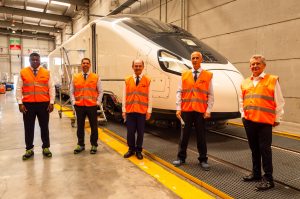 Repsol and Talgo agreed to jointly develop projects to promote the manufacturing of renewable hydrogen-powered trains and the creation of emission-free rail transport in the Iberian Peninsula. The agreement, signed on July 19 2021 at the train manufacturer’s plant in Las Rozas, Madrid, has been signed by Juan Abascal, the Repsol’s executive director of Industrial Transformation and Circular Economy and Carlos Palacio Oriol, the Chairman of Talgo. The event was attended by Emiliano López Atxurra, the Chairman of Petronor, an independent oil and gas exploration company.
Repsol and Talgo agreed to jointly develop projects to promote the manufacturing of renewable hydrogen-powered trains and the creation of emission-free rail transport in the Iberian Peninsula. The agreement, signed on July 19 2021 at the train manufacturer’s plant in Las Rozas, Madrid, has been signed by Juan Abascal, the Repsol’s executive director of Industrial Transformation and Circular Economy and Carlos Palacio Oriol, the Chairman of Talgo. The event was attended by Emiliano López Atxurra, the Chairman of Petronor, an independent oil and gas exploration company.
Under the collaboration agreement, Talgo will be responsible for the design, manufacture, and commissioning of the new self-propelled trains for short and medium distances, while Repsol will offer up its renewable hydrogen generation infrastructure and the company’s logistical means to supply the railway network.
Repsol will use organic waste to generate biogas at its industrial centers, which will be used to produce renewable hydrogen. It has announced the installation of two electrolyzers with a capacity of 100 MW in Cartagena and Petronor will supply its complexes with renewable hydrogen.
Talgo is developing renewable hydrogen-powered trains that will make it possible to decarbonise the railway lines, especially those of the secondary network that are not electrified. To this end, it has developed its Vittal One train, a modular solution for medium-distance and commuter trains powered by hydrogen fuel cells, which will be the first dual hydrogen-electric train. The company is also planning to put on track next November a first train that will allow demonstrating and validating the concept in conditions similar to those of commercial operation.
The Vittal One hydrogen train uses electric motors that obtain energy thanks to hydrogen cells, which turn this fuel into an electric current. This type of train can run on non-electrified tracks and without the need to install a catenary or make any other type of modifications. As such, it is a mobility solution that doesn’t need long additional developments. It also benefits in particular those regions connected to secondary rail lines that have not yet been electrified, by allowing a quick and easy implementation of decarbonized mobility.
This agreement is one of the initiatives that puts Spain at the forefront of renewable hydrogen production in southern Europe. The initiatives include the Basque Hydrogen Corridor, launched in February 2021 by Petronor-Repsol and which already brings together 128 companies for which Talgo is involved, the Hydrogen Valley Catalonia, coordinated by the Universitat Rovira i Virgili, Repsol, and Enagás, the renewable hydrogen hub around the Escombreras Valley, in Cartagena and the Hydrogen cluster of Castilla-La Mancha, with the installation of a renewable hydrogen production plant using photoelectrocatalysis, a technology that Repsol is developing together with its partner Enagás, which will place the Puertollano Industrial Complex at the forefront of the sector.
Share on:



